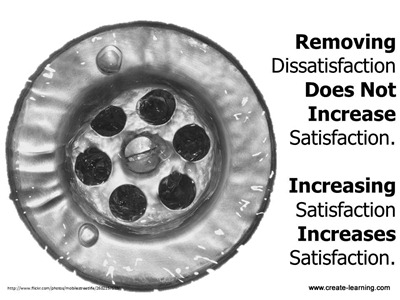Dissatisfiers |
Satisfiers |
|
|
The work of Frederick Herzberg and motivational theory points to some interesting things. We often believe that what causes dissatisfaction and satisfaction are conjoined.
For example, salary is a factor in an employee being dissatisfied or the more recent term is engaged many believe that by increasing their salary you will create satisfaction.
NOT TRUE
The elimination of things that cause dissatisfaction does not equate to satisfaction.
As anyone who has ever left a job for another one that offers more money can tell you, higher salary can just create a more dissatisfied person with more money.
While I agree salary is important and shows the respect you have for people, simply offering more money will not magically create more satisfied people.
So what?
Following the belief that satisfiers are motivators towards doing great work and being engaged, because they have a positive effect on the work itself.
One of the strongest satisfiers is achievement. This is also evidenced by Teresa Amabile’s work in ‘The Progress Principle’.
People are not motivated by continued failure; they are motivated by achievement. Achieving small wins and making progress on work that is meaningful.
Remaining unencumbered by managers who use and believe that dissatisfiers and ‘you got to kick them’ to motivate work.
“We can expand … by stating that the job satisfiers deal with the factors involved in doing the job, whereas the job dissatisfiers deal with the factors which define the job context.”
http://www.businessballs.com/herzberg.htm
Now what?
- Achievement – taking steps towards doing things better than before and working towards goals. Influences people to do more of what they are achieving.
- Recognition – Someone recognizing the achievement in some way, also influences people to do more of what they are doing.
These 2 satisfiers can increase the engagement of work teams and people.
This reminds me of an interaction I had recently with a manager who hired me to coach a new manager who was struggling with solving problems and staying on top of his work.
Manager, “Mike, for some reason Fred wants to run in here and tell me what problem he solved every time he does something. I wish he would just do his work.”
Me, “Didn’t you say you wanted Fred to solve more problems, and that is why you hired me to coach him?”
Manager, “Yes, he should just do his work.”
Me, “Recognition is a strong form of motivation, just listen to Fred & congratulate him on solving the problem, that is what you wanted right?”
Manager, “Yes but..”
Me, “Yes but nothing. What you are doing is ruining the progress we’ve made. It is as if you know that recognition drives results, but you refuse to recognize the results, then you get upset when the results stop.”
Manager, “Shit, you are right.”
What do you think?
What part does dissatisfiers and satisfiers play in your work? As a manager how do you recognize achievement? How can you recognize achievement better in others?



